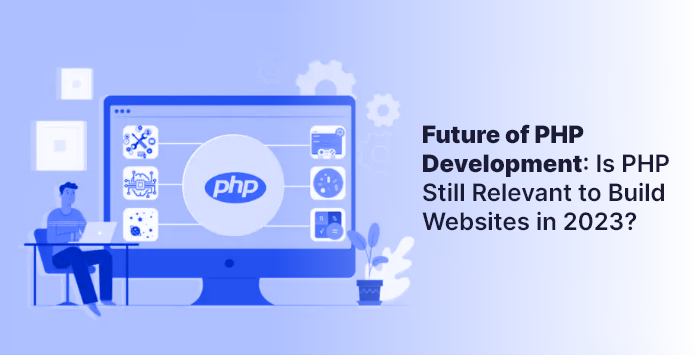Is PHP Still Relevant to Build Websites in 2023?

PHP has been a popular programming language since its creation in 1994 by Rasmus Lerdorf. The technology is widely used for web development due to its simplicity, flexibility, and ease of integration with other web technologies.
However, with the rise of newer programming languages like Python, JavaScript, and Ruby, some developers have questioned whether PHP is still relevant in 2023.
In this article, we will explore the future of PHP development and assess whether PHP is still a relevant choice for building websites in 2023.
The current state of PHP
PHP is still a popular programming language in 2023 and remains one of the most widely used languages for web development. According to the latest Stack Overflow Developer Survey, PHP is the fifth most popular language among developers worldwide. Additionally, PHP is still used by some of the most popular websites, such as Facebook, Wikipedia, and WordPress.
PHP 8, released in November 2020, introduced several new features and improvements, such as improved performance, new features for error handling, and new language constructs. This release demonstrates that the PHP development community is still actively working on improving the language and keeping up with the latest trends in web development.
Future of PHP development
While PHP is still a popular language in 2023, it is essential to consider the future of PHP development to determine whether it is still relevant for building websites. Here are some trends that are shaping the future of PHP development.
1. Increased focus on performance
As web applications become more complex, there is an increasing demand for faster and more efficient code. In response to this demand, the PHP development community has been focusing on improving the performance of the language. PHP 8 introduced significant improvements to performance, including just-in-time compilation and improved memory usage.
Additionally, several PHP frameworks, such as Laravel and Symfony, have been optimized for performance, making it easier to build high-performance web applications using PHP.
2. Integration with other web technologies
PHP has always been an easy language to integrate with other web technologies, such as HTML, CSS, and JavaScript. However, in recent years, there has been an increased focus on integrating PHP with other technologies, such as cloud computing platforms and containerization technologies like Docker.
This trend is expected to continue as developers seek to build applications easily deployed and scaled using cloud technologies.
3. Embracing modern web development practices
As web development practices continue evolving, PHP developers embrace modern practices, such as test-driven development, continuous integration and delivery, and microservices architecture. These practices are essential for building robust, scalable, and maintainable web applications.
The PHP development community has quickly adopted these practices, and many PHP frameworks, such as Laravel and Symfony, include built-in support for them.
4. Increased focus on security
As web applications become more complex, there is an increasing need for robust security measures to protect against cyber threats. PHP developers are increasingly focused on building secure applications, and the PHP development community has been actively developing tools and best practices to improve application security.
For example, the PHP Security Consortium is a group of PHP developers who collaborate on developing best practices for PHP application security. Additionally, PHP frameworks like Laravel include built-in security features like password hashing and encryption.
5. Greater use of artificial intelligence and machine learning
Artificial intelligence (AI) and machine learning (ML) are becoming increasingly important in web development. PHP developers are beginning to explore how these technologies can be integrated into PHP applications to improve functionality and user experience.
For example, PHP developers can use PHP libraries like Tensorflow PHP to build ML models and integrate them into PHP applications. It allows for more personalized and intelligent user experiences.
6. Increased use of serverless architecture
Serverless architecture is a web development trend involving building applications using functions executed in the cloud. It allows for more efficient use of resources and reduces business costs.
PHP developers can use serverless architectures to build scalable and flexible applications that can be easily deployed and scaled. It can be done using cloud platforms like AWS Lambda or Google Cloud Functions.
7. The continued growth of PHP frameworks
PHP frameworks are essential tools for developers building web applications using PHP. They provide a set of pre-built functions and features that make it easier and faster to develop applications.
We expect continued growth in the number and popularity of PHP frameworks. It is because frameworks make it easier to build complex applications using PHP and are essential for building modern, scalable, and maintainable applications.
8. Greater focus on microservices architecture
Microservices architecture is a web development trend involving building applications as a collection of independent, loosely-coupled services. PHP allows for greater flexibility and scalability in building applications.
PHP developers are increasingly adopting microservices architecture, and many PHP frameworks, such as Lumen and Slim, have been optimized for building microservices applications.
9. Greater emphasis on DevOps
DevOps is a set of practices that emphasizes collaboration and communication between development and operations teams. It involves automating and streamlining the development and deployment process, which can help reduce errors and improve application quality.
PHP developers are increasingly adopting DevOps practices, and many PHP frameworks, such as Laravel and Symfony, include built-in support for continuous integration and delivery.
10. Integration with emerging web technologies
As the web continues to evolve, new technologies are emerging that will shape the future of web development. PHP developers are keeping up with these emerging technologies and finding ways to integrate them into their applications.
For example, PHP developers are integrating with emerging web technologies such as WebAssembly, Progressive Web Apps (PWA), WebRTC, and WebSockets. This integration allows PHP applications to use new web capabilities and provide more immersive and interactive user experiences.
In addition, PHP developers are adopting new front-end frameworks and libraries such as React, Vue.js, and Angular to build modern and responsive user interfaces. This integration allows PHP developers to build web applications that are fast, responsive, and user-friendly.
Conclusion
Based on the trends discussed above, it is clear that PHP is still an appropriate choice for building websites in 2023. The language is still widely used for web development, and the PHP development community is actively working on improving the language and keeping up with the latest trends in web development.
Furthermore, the trends shaping the future of PHP development, such as an increased focus on performance, integration with other web technologies, embracing modern web development practices, and increased focus on security, are the fruitful future of web applications for online ventures.
Would you like to receive similar articles by email?





